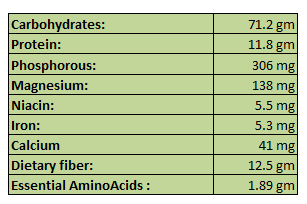Top 8 Health Benefits of Wheat
Wheat is fortunately one of the most consumed and popular grains all over the Indian subcontinent. In the recent years, it has also found a place in the global perspective because of its comparatively higher dietary fiber content which is partially responsible for the large portion of the health benefits of wheat.
This article discusses a couple of the benefits of this famous cereal. Once you equip yourself with the knowledge of the health benefits of wheat, it will be fairly easy to put them to good use, curing many ailments.
Other names of Wheat –
- Triticum aestivum (Botanical name)
- Godhumai (Tamil)
Calories (energy) in Wheat : 346 K.cal / 100 gm
Major Nutrients Present in Wheat :
Health Benefits of Wheat:
The Positive Facet of Consuming Wheat are as follows:
- The dietary fiber in wheat flour, commonly known as atta in the Indian households, is extremely beneficial for obese patients.
A survey conducted by The American Journal of Clinical Nutrition proved that women who replaced refined flour with whole wheat flour in their diets for a prolonged period of time, experienced continued weight loss over the stretch of time.
- People with pear shaped bodies suffer from visceral obesity, high cholesterol levels and several other common metabolic disorders. This is due to the high concentration of saturated fats and Trans fats in the refined flour. Putting the individual at risk of higher blood pressure, it increases the chances of cardiac arrest. Consuming wheat flour will balance the elevated levels of blood pressure and helps the body stay healthy.
- Wheat is rich in mineral called magnesium. This magnesium is the co-factor for over three hundred enzymes, including the enzymes regulating insulin secretion. Along with certain types of cancer, it also helps you to combat a large number of coronary ailments including Type 2 diabetes.
- Betaine, another phyto-nutrient found abundantly in wheat relieves inflammation. Most rheumatic diseases are characterized by large margins of inflammation. The betaine concentration of whole wheat helps patients with chronic inflammation and pain issues to relieve both the symptoms, which are a cause of their discomfort. Probably, this health benefit of wheat remained undiscovered for the longest.
- The insoluble fiber and insoluble carbohydrate content of the whole wheat renders body to stool. This ensures that all the solid waste is mixed thoroughly with the bile juice. This bile juice is often secreted in considerably higher amounts, especially if the diet is rich in food that contains large amounts of fats. By lowering the bile concentration, whole wheat helps in prevention of gallstones, a growing clinical condition that has affected the eating habits of patients.
- Wheat is a good source of carbohydrate. It stays in the stomach for long curbing hunger for a considerably longer period. Moreover, the starch in the wheat is released slowly into the bloodstream maintaining a regular uninterrupted source of energy.
- Keeping constipation, dysentery, nausea and flatulence at bay, whole wheat is a much healthier substitute to most bread available in the market. It is good if your digestive health has not been well lately.
- In women, wheat balances the metabolic rates of estrogen. Estrogen has been strongly linked to breast cancer genes. Thus, whole wheat acts as an anti-carcinogenic. Lignans, a phyto-nutrient in wheat often occupy the hormone receptors, which alleviates the chances of occurrence of cancer.
Wheat is here to stay for our own good. It is completely up to us to accept the health benefits of wheat and acknowledge it by incorporating it in our diet.
Points of Caution:
- Gluten in wheat can cause severe sensitivities and allergic reactions.
- Processed wheat product raises blood sugar level, increases obesity, creates a paste in the intestine like glue causing constipation.
Image Credit : Suraj
REFERENCES:
Major Nutrients Present- Nutritive Value of Indian Foods from National Institute of Nutrition.
Last Published: 2015/10/28

